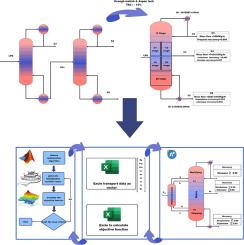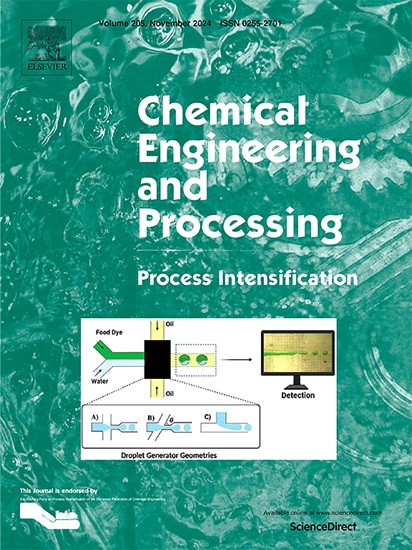Application of dividing wall column technology for liquid petroleum gas fractionation and optimization using whale optimization algorithm and hybrid approaches
IF 3.9
3区 工程技术
Q3 ENERGY & FUELS
Chemical Engineering and Processing - Process Intensification
Pub Date : 2025-07-25
DOI:10.1016/j.cep.2025.110472
引用次数: 0
Abstract
Dividing Wall Columns (DWC) have gained significant attention for their ability to reduce energy consumption and capital costs in chemical separation processes. However, achieving an optimal design remains a complex challenge due to the nonlinear and multivariable nature of DWC systems This study aims on the application of DWC in liquid petroleum gas (LPG) fractionation process, to reduce high energy cost of traditional two-tower process, and compares different optimization algorithms, including the Whale Optimization Algorithm (WOA) and two novel hybrid variants, GA-WOA and GA-PSO. These advanced metaheuristic solvers were benchmarked against traditional algorithms, including Genetic Algorithm (GA) and Particle Swarm Optimization (PSO), through comprehensive comparative analysis. The results demonstrate that the GA-WOA hybrid delivers the best overall performance in solution quality, achieving the lowest Total Annual Cost with reductions of 27 % in condenser duty, over 10 % savings in reboiler duty, and a 14 % decrease in TAC compared to conventional two-column configurations. Among the standalone algorithms, WOA provides the best solution quality. While PSO emerges as the fastest converging algorithm, the GA-WOA hybrid provides the most balanced performance between solution quality and computational efficiency. Among the hybrid approaches, GA-PSO ranks as the second-best performer in terms of solution optimality. These statistically validated findings confirm the economic and energy benefits of DWC technology while establishing WOA hybrids, particularly GA-WOA, as powerful, reliable tools for complex chemical process optimization.

分壁塔技术在液化石油气分馏中的应用及鲸鱼优化算法和混合方法的优化
分隔墙柱(DWC)因其在化学分离过程中降低能源消耗和资本成本的能力而受到广泛关注。然而,由于DWC系统的非线性和多变量特性,实现优化设计仍然是一项复杂的挑战。本研究旨在将DWC应用于液化石油气(LPG)分馏过程,以降低传统双塔工艺的高能源成本,并比较了不同的优化算法,包括Whale优化算法(WOA)和两种新型混合算法GA-WOA和GA-PSO。将这些先进的元启发式求解方法与遗传算法(GA)和粒子群算法(PSO)等传统算法进行了综合比较分析。结果表明,GA-WOA混合系统在溶液质量方面提供了最佳的整体性能,与传统的双柱配置相比,冷凝器负荷减少27%,再沸器负荷节省10%以上,TAC减少14%,实现了最低的年总成本。在独立算法中,WOA提供了最好的解决方案质量。虽然粒子群算法是最快的收敛算法,但GA-WOA混合算法在解决方案质量和计算效率之间提供了最平衡的性能。在混合方法中,GA-PSO在解决方案最优性方面排名第二。这些经过统计验证的发现证实了DWC技术的经济和能源效益,同时建立了WOA混合动力,特别是GA-WOA,作为复杂化工过程优化的强大、可靠的工具。
本文章由计算机程序翻译,如有差异,请以英文原文为准。
求助全文
约1分钟内获得全文
求助全文
来源期刊
CiteScore
7.80
自引率
9.30%
发文量
408
审稿时长
49 days
期刊介绍:
Chemical Engineering and Processing: Process Intensification is intended for practicing researchers in industry and academia, working in the field of Process Engineering and related to the subject of Process Intensification.Articles published in the Journal demonstrate how novel discoveries, developments and theories in the field of Process Engineering and in particular Process Intensification may be used for analysis and design of innovative equipment and processing methods with substantially improved sustainability, efficiency and environmental performance.

 求助内容:
求助内容: 应助结果提醒方式:
应助结果提醒方式:


